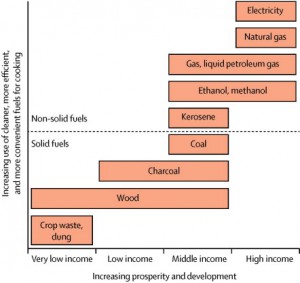 What is the world’s deadliest environmental problem?
What is the world’s deadliest environmental problem?
Household air pollution. According to the World Health Organization’s latest report air pollution is now the world’s largest single environmental health risk, and the main cause is entirely preventable:
Around 3 billion people still cook and heat their homes using solid fuels (i.e. wood, crop wastes, charcoal, coal and dung) in open fires and leaky stoves. Most are poor, and live in low- and middle-income countries.
Such inefficient cooking fuels and technologies produce high levels of household air pollution with a range of health-damaging pollutants, including small soot particles that penetrate deep into the lungs. In poorly ventilated dwellings, indoor smoke can be 100 times higher than acceptable levels for small particles. Exposure is particularly high among women and young children, who spend the most time near the domestic hearth.
Household air pollution (HAP) caused by the inefficient use of solid fuels results in 4.3 million premature deaths each year – almost three times as many as died from from AIDS. HAP is also an important contributor to ambient air pollution, which caused a further 3.7 million deaths in 2012. Additionally, more than 50 percent of premature deaths among children under 5 are due to pneumonia caused by particulate matter (soot) inhaled from household air pollution.
What is household air pollution?
 Household air pollution is usually measured indoors, and arises from domestic activities, particularly in low and middle income countries. Every day almost half the planet’s population — 3 billion people — are exposed to toxic amounts of HAP because they use solid fuels, a term that includes biomass fuels (derived from plant sources) or coal for combustion resulting in the release of products of incomplete combustion such as carbon monoxide and particulate matter. The problem arises because solid fuel is commonly used in homes with poor or absent chimney ventilation of smoke.
Household air pollution is usually measured indoors, and arises from domestic activities, particularly in low and middle income countries. Every day almost half the planet’s population — 3 billion people — are exposed to toxic amounts of HAP because they use solid fuels, a term that includes biomass fuels (derived from plant sources) or coal for combustion resulting in the release of products of incomplete combustion such as carbon monoxide and particulate matter. The problem arises because solid fuel is commonly used in homes with poor or absent chimney ventilation of smoke.
What is the primary cause of household air pollution?
Cooking, heating, and lighting using solid fuels indoors. But cooking, according to a new study in The Lancet, is the energy requirement that consumes most solid fuel worldwide. Lighting can also result in substantial HAP, since smoky unvented wicks in simple lamps that burn kerosene and in candles can result in substantial black carbon smoke.
Who is most affected by HAP?
Mostly women and children who live in severe poverty in Africa and Asia. As The Lancet study notes, in most cultures women have a leading role in domestic cooking, with men cooking when at work or away from home. In the typical domestic context, therefore, women have several periods of intense cooking smoke exposure per day. Young children and infants, typically carried on the back or placed near their mother to sleep, are also exposed to these short, very high level, exposures to smoke.
What can be done to reduce HAP?
Specific interventions such as the use of improved fuels, cookstoves, or heaters, and improved ventilation using improved cooking technology, can improve human health.
What the world’s three billion energy-poor people really need is what those of us in the West take for granted: cheap electricity to cook their food and heat their homes. The only truly effective long-term solution to energy poverty is economic growth. Long-term economic growth, however, is dependent on increasing economic freedom, the rule of law, and access to markets in developing areas. Such preconditions are much more difficult to implement than actions that merely require passing laws that ban environmentally-harmful actions.
Other posts in this series:
Sen. Lee’s ‘Family-Friendly’ Tax Reform Plan? • President Obama’s Budget • The Sequester • Obamacare’s Contraceptive-Abortifacient Mandate • School Choice • Right to Work Laws and Economic Freedom • The Fiscal Cliff Proposals

